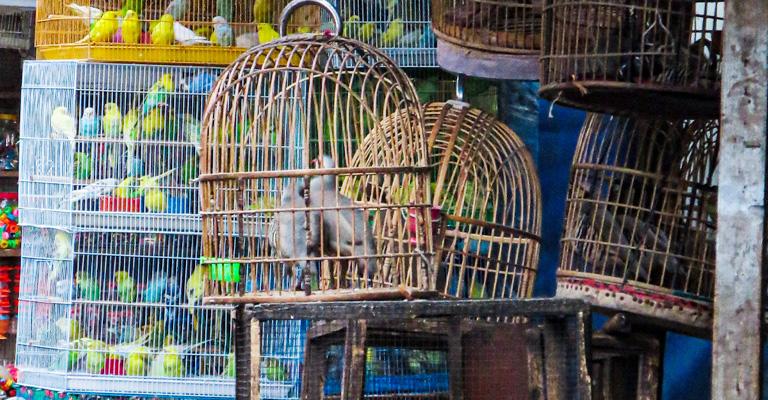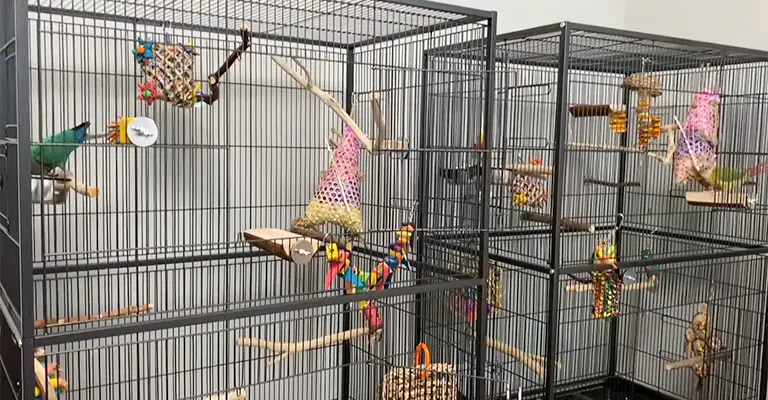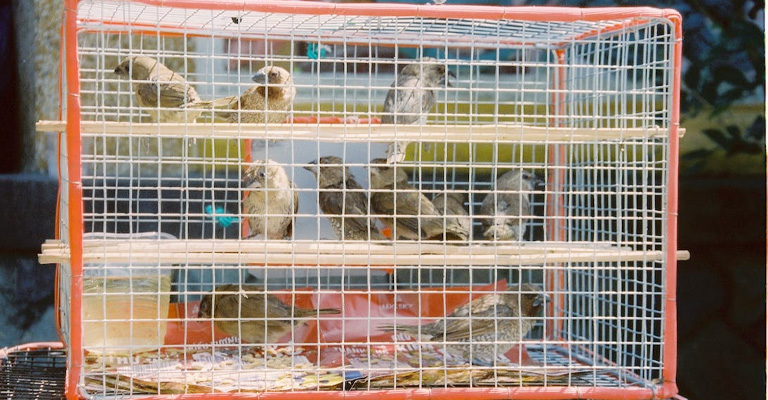Bird enthusiasts and pet owners often find themselves in a quandary when it comes to choosing the right enclosure for their avian companions. Round bird cages, with their unique aesthetics, have gained popularity, but an important question looms: Are round cages bad for birds?
Traditionally, rectangular or square cages have been the norm, designed to provide a functional and comfortable living space for birds.
In this exploration, we delve into the pros and cons of round bird cages to shed light on whether their curved design is a boon or a bane for our avian companions.
As we navigate the complexities of cage design and its effects on our feathered friends, we aim to provide insights that can help you make an informed decision about the habitat of your cherished birds.

Are Round Cages Bad for Birds?
Round cages can be less ideal for birds compared to traditional rectangular or square cages. While they may have unique aesthetics, there are several reasons why round cages are often considered less suitable for avian companions:
Limited Corner Perches
Round cages lack corners, which are important for birds to rest and feel secure. Without corners, birds may struggle to find comfortable perching spots, potentially leading to stress.
Reduced Vertical Space
Birds like to climb and explore vertically. Round cages typically offer less vertical space than rectangular cages, limiting the bird’s ability to engage in natural behaviors.
Awkward Placement of Accessories
It can be challenging to place essential accessories like food and water dishes, toys, and perches effectively in a round cage, potentially leading to an impractical and cluttered environment.
Bar Spacing
The curvature of round cages can result in varying bar spacing, which may not be suitable for all bird species. Some birds could get their heads or bodies stuck between bars.
Stress and Agitation
The circular design can be disorienting for birds, as they may feel exposed from all angles. This can lead to stress and a sense of vulnerability.
Cleaning Difficulties
Round cages can be harder to clean thoroughly due to their shape, potentially leading to hygiene issues.
Limited Hanging Space
Round cages can restrict the placement of hanging toys and swings, which are essential for mental and physical stimulation. This limitation can result in a less enriched environment for the bird.
Difficulty in Adding Accessories
Adding and securing accessories like cuttlebones, mirrors, or water bottle holders can be challenging in round cages, potentially leading to instability or inconvenience.
Uneven Air Circulation
Round cages can create uneven air circulation, making it difficult to maintain a consistent and comfortable temperature within the cage, which is important for the bird’s health.
Inadequate Nesting Space
If you plan to breed birds, round cages may not provide sufficient nesting space or privacy for nesting pairs, which can impact breeding success.
Potential for Injury
The curved design of round cages can sometimes lead to birds flying into the cage’s walls, resulting in injuries or stress.
Space Wastage
Round cages may waste space in the center, making it challenging to fully utilize the cage’s interior for the bird’s needs.
While round cages can work for specific bird species or as temporary enclosures, rectangular or square cages are generally more practical for providing the space, security, and comfort that birds need.
When choosing a cage for your feathered friend, consider the bird’s species, size, and specific requirements to ensure their well-being and happiness.
How to Find the Best Bird Cage?

Finding the best bird cage for your feathered companion involves considering several crucial factors to ensure their safety, comfort, and well-being. Here’s a step-by-step guide to help you choose the right bird cage:
Determine the Right Size
Research the specific requirements for your bird’s species in terms of cage size. Different birds have varying needs for space and vertical height.
As a general rule, the cage should be as large as possible within your available space and budget. Birds benefit from ample room to move, fly, and exercise.
Consider the Bar Spacing
The space between the bars should be appropriate for your bird’s size and species. Ensure that your bird cannot fit its head between the bars or become stuck. Smaller birds typically require narrower bar spacing than larger ones.
Choose the Right Shape
Rectangular or square cages are often more practical than round ones, as they provide corners for perching and access to accessories. If you prefer a round cage, ensure it meets the needs of your bird in terms of size and bar spacing.
Check for Durability and Material
Opt for a cage made of non-toxic, bird-safe materials such as stainless steel, wrought iron, or powder-coated metal. Ensure that the cage is sturdy and well-constructed to prevent escapes and injuries.
Assess Access and Cleaning
Look for cages with easy-access doors and feeders for convenient feeding and cleaning. Consider removable trays or grates for straightforward cage maintenance.
Provide Adequate Accessories
Plan for perches, toys, and feeding/watering dishes within the cage. Ensure there is enough space to accommodate these items. Include a variety of toy types to provide mental stimulation and prevent boredom.
Prioritize Safety Features
Check for secure latches on doors and openings to prevent accidental escapes. Ensure there are no sharp edges, pointed ends, or potential hazards inside the cage.
Consider Mobility
If you plan to move the cage frequently, look for one with casters or wheels for easy mobility.
Evaluate Aesthetics and Placement
While aesthetics is a personal preference, choose a cage that complements your home decor and allows your bird to feel integrated into your living space. Place the cage in an area with good natural light, but avoid direct sunlight and drafts.
Budget and Brand
Set a budget for the cage and stick to it while considering the features and quality that matter most to you. Research reputable brands and read reviews to ensure you’re getting a reliable product.
Consider Future Needs
Think about the potential growth of your bird or the addition of more birds in the future. Choose a cage that can accommodate these changes.
Remember that the welfare of your bird should be the top priority when selecting a cage. Taking the time to research and choose the right cage will contribute significantly to your pet bird’s health and happiness.
Types of Bird Cages

There are several types of bird cages available, each designed to meet specific needs and preferences. Here are some common types of bird cages:
Rectangular or Square Cages
These are the most common and versatile bird cages. They come in various sizes and are suitable for a wide range of bird species.
Rectangular or square cages provide corners for perching and easy placement of accessories.
Round Cages
Round cages have a unique aesthetic appeal but may not be as practical as rectangular ones. They are generally used for smaller birds and should be chosen carefully to ensure they meet the bird’s needs.
Flight Cages
These are large, rectangular cages designed to give birds ample space for flying and exercising.
Flight cages are ideal for birds that need room to stretch their wings, such as budgerigars, canaries, and finches.
Breeding Cages
Breeding cages are often designed with a divider or multiple compartments to separate pairs of birds during the breeding season. They allow for controlled breeding and can be equipped with nest boxes.
Travel Cages
Travel cages are compact, lightweight, and designed for transporting birds safely. They are convenient for trips to the vet, vacations, or other outings.
Outdoor Aviaries
Aviaries are large, outdoor enclosures designed for birds to enjoy natural sunlight, fresh air, and ample space for flying. They are suitable for larger parrots and exotic birds and should be predator-proof.
Stainless Steel Cages
These cages are known for their durability and resistance to rust. They are a popular choice for larger birds and are easy to clean and maintain.
Wrought Iron Cages
Wrought iron cages are sturdy and come in various styles and designs. They are suitable for medium to large-sized birds and offer a balance between durability and aesthetics.
Acrylic Cages
Acrylic cages are often used for smaller birds and are known for their clear panels, allowing for excellent visibility of your pet. They are easy to clean but may not be as durable as metal cages.
Custom Cages
Some bird owners opt for custom-made cages to meet specific size and design requirements.
These cages can be tailored to fit your bird’s needs perfectly.
When choosing a bird cage, it’s essential to consider your bird’s species, size, and specific requirements, as well as factors like safety, durability, and aesthetics. Providing the right type of cage is crucial for your bird’s health, happiness, and overall well-being.
FAQs
The ideal cage size varies depending on the species and size of your bird. As a general guideline, the cage should be large enough to allow the bird to spread its wings fully and fly short distances within the cage.
Bird cages should be cleaned regularly to maintain hygiene. Daily tasks include removing uneaten food, changing the water, and spot-cleaning droppings. A thorough cleaning of the entire cage, including perches and toys, should be done at least once a week.
It’s possible to use a used bird cage, but it should be thoroughly cleaned and disinfected before introducing a new bird.
Ensure there are no rust, sharp edges, or potential hazards. Used cages should also meet the size and safety requirements for your specific bird species.
Many bird cages have solid or grated bottoms. Solid bottoms are easier to clean but require more frequent cleaning, while grated or mesh bottoms allow debris to fall through, reducing the need for frequent cleanings. The choice depends on your preference and your bird’s comfort.
Essential accessories include perches of varying diameters for foot health, food and water dishes, and toys for mental stimulation. The specific accessories can vary depending on your bird’s species and preferences.
Conclusion
The debate surrounding round bird cages underscores the need for careful consideration when choosing the ideal living space for our feathered companions. While these cages certainly possess unique aesthetic appeal, it’s essential to weigh their advantages and disadvantages.
Round cages can provide ample space for birds to move around and may promote social interaction due to their open design. However, they also present challenges, such as limited corner perches and reduced vertical space.
The decision to opt for a round cage or a more conventional rectangular one should prioritize the comfort, safety, and happiness of the bird. Factors like cage size, bar spacing, and the specific needs of the bird species in question should guide your choice.
Ultimately, the well-being of your avian companion should be the foremost consideration, ensuring that their living environment, whether round or rectangular, offers the space and amenities necessary for a healthy and contented life.